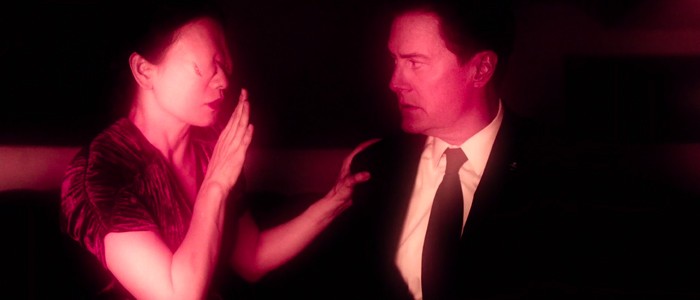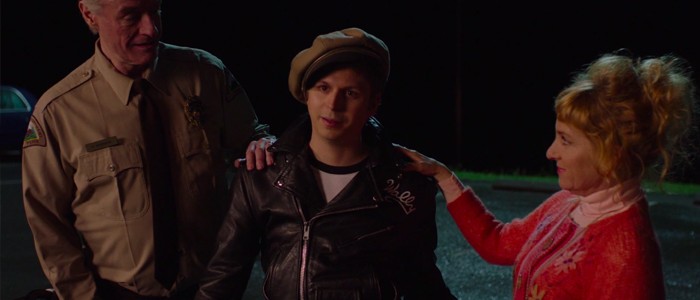'Twin Peaks: The Return' Review: Exploring The Best Moments In Parts 3 And 4
(Each week, we're going to kick off discussion about Twin Peaks: The Return by answering one question: what was the best scene of the episode?)
Last week, Showtime unveiled the two-part premiere of Twin Peaks (or Twin Peaks: The Return, as it's being called on their website). The premium channel dropped parts 3 and 4 online immediately afterwards, and then aired those back to back on the traditional channel last night, marking the final time until September's season finale that they'll release two parts in a row on a Sunday evening.
Ahead, we dive into the best scenes of parts 3 and 4, including Cooper's trip through space and the jaw-dropping introduction of a new character named Wally Brando.
The Best Scene in Part 3
After kicking off this limited series in a relatively restrained way last week, David Lynch and Mark Frost fittingly followed it up with what I consider the strangest, most out-there episode of Twin Peaks in the show's entire history. Part 3's opening scene happens to be its best, with FBI Special Agent Dale Cooper (Kyle MacLachlan) falling through a starry landscape and ending up inside a floating metal box suspended in space.
Inside, he meets a blind woman who tries to protect him from an unseen malevolent force banging on a door, and the whole thing is edited with a choppy, time-skewing style that enhances the primitive, guttural fear that Lynch is such a master at conjuring. By the time Cooper gets sucked into a panel on the wall, the filmmaking is so good, it doesn't even matter if you don't understand what's happening. The first fifteen minutes are bold, controlled storytelling, and my mind reels thinking about how someone was ever able to come up with this stuff.
The rest of the episode isn't quite as surreal, but can still be a little tough to follow. Here's my understanding of what happens: the evil spirit Bob, who's inhabiting Cooper's doppelgänger – let's call him DoppelCooper – escaped the Black Lodge at the end of season 2. In the years since, he somehow manufactured a Cooper clone named Dougie Jones in the hopes that if the real Cooper ever escaped the Black Lodge, Cooper would trade places with Dougie instead of DoppelCooper. Aside from some heavy vomiting and a car crash as a side effect, this plan comes to fruition in this episode: DoppelCooper is supposed to switch places with the real Coop via the the cigarette lighter in his car, but by holding his own mouth shut, he's able to force Dougie Jones to be the one who's transported to the Black Lodge while the real Cooper travels through an electrical socket and replaces Dougie. The trouble is, the real Cooper now appears to be nearly braindead. (And Dougie is turned into a small golden sphere. I told you this episode was bonkers.)
Meanwhile, Hawk (Michael Horse) and the Twin Peaks police are having problems figuring out the missing link to Cooper's case, and Dr. Jacoby (Russ Tamblyn) is spray painting gold shovels for some reason. I assume we'll eventually find out why, but knowing this show, I wouldn't be surprised if we never saw him again. The braindead Cooper is dropped off at a casino and earns the nickname "Mr. Jackpot" after following visions that tell him which slot machine to play.
DoppelCooper's car crash draws the attention of Coop's former FBI buddies Gordon Cole (Lynch) and Albert Rosenfeld (Miguel Ferrer). Along with Agent Tamara Preston (Chrysta Bell, who doesn't seem to fit with the vibe of this show), they set out for South Dakota to see if this is actually their long-lost friend and colleague.
The Best Scene in Part 4
We've made it through the madness of Part 3, only to be introduced to a whole different kind of absurdity in the best scene of Part 4: the introduction of Michael Cera's Wally Brando. He's the son of Twin Peaks' Deputy Andy (Harry Goaz) and Lucy Brennan (Kimmy Robertson), and in a show stuffed with truly bizarre characters, this one ranks right up there with the Log Lady at the top of the heap. The character rides his motorcycle over to the police department to pay his respects to Sheriff Harry S. Truman (who we hear is sick, but don't actually see on the show since actor Michael Ontkean apparently isn't returning), and settles for giving an extended speech in the parking lot to Harry's brother, Frank (played by Robert Forster).
Cera's performance is delightfully batshit. He adopts a lisp, spouts platitudes about life on the open road, and seems to be seconds away from bursting into laughter at any moment. Half of his speech feels improvised, and I wouldn't be surprised if Lynch and Frost just let him riff for a while and included all of it in the final cut. But his balance of strangeness and sincerity feels like a spiritual callback to the early seasons, which vacillated between tone at a moment's notice. It's pure Twin Peaks. My new favorite thing is knowing that Oscar nominee Robert Forster had to stand there and listen to Cera saying that stuff. It's hilarious.
Meanwhile, Cooper still seems to have the mentality of a very young child – and a knack for hitting the jackpot at that casino. He eventually takes his winnings to Dougie's house and meets Dougie's wife (Naomi Watts) and their son Sonny Jim (Pierce Gagnon from Looper), neither of whom seem to realize that the man before them is a different person than the man they've presumably spent the past few years with. Sure, they look alike, but for God's sake, pick up on some of those cues! His first cup of coffee seems to wake him up a bit, but it remains to be seen how much longer we'll have to endure this version of the character.
Elsewhere, Gordon, Albert, and Tamara meet DoppelCooper at a federal facility in South Dakota, and they immediately know something's not right. During their interrogation, it appears as if DoppelCooper's head is digitally inserted onto someone else's body, or perhaps digitally enlarged by five or ten percent. The end result is off-putting but still subtle, and adds yet another layer to the uneasy tension of the scene. There's a reference to Phillip Jeffries (David Bowie's character from Fire Walk With Me), and outside, Albert and Cole determine they need to find a certain woman to assess this Cooper situation for them, leaving us hanging until next week before we find out who it is.
This Week's Clues
I don't want this section to imply that Twin Peaks is some kind of puzzle to be solved. But with things like coded messages or strange numbers popping up that clearly have some kind of mysterious significance, I thought it'd be fun to try to keep track of those things on a weekly basis and see if we can figure out what the show is trying to say with them.
Looking back on last week's clues, we now know that the Arm (in his new form as an electric brain tree) was trying to tell Cooper to prepare for 2:53, the time during which he could switch places with DoppelCooper. The Giant's intonations are still a mystery to me.
This week, Cooper encounters two technological panels in that metal space box: one with the number "15" on it, and one with the number "3." We're reminded, thanks to his key to his room at The Great Northern Hotel, that he stayed in number 315 during his time there. He also sees the floating head of Major Garland Briggs (Don S. Davis) in space, who speaks two words to him: "blue rose." Fans have deciphered this term (which appeared back in Fire Walk With Me) to be a signifier of something supernatural, which may explain why Albert and Cole close out part 4 by referencing it in relation to there being something "off" about the man we know as DoppelCooper.
Also worth noting: in the Black Lodge, the real Cooper was wearing a pin on his jacket that appeared to be standard issue for FBI agents. But when he comes out of the electrical socket and back into the real world, the pin has vanished (and is gone throughout the remainder of the episode). This seems like a detail too purposeful to be a simple continuity error, but like many things in the world of Twin Peaks, its significance remains unknown.


